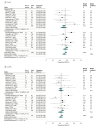Comparison of Allogeneic Stem Cell Transplant and Autologous Stem Cell Transplant in Refractory or Relapsed Peripheral T-Cell Lymphoma: A Systematic Review and Meta-analysis
- PMID: 34042995
- PMCID: PMC8160596
- DOI: 10.1001/jamanetworkopen.2021.9807
Comparison of Allogeneic Stem Cell Transplant and Autologous Stem Cell Transplant in Refractory or Relapsed Peripheral T-Cell Lymphoma: A Systematic Review and Meta-analysis
Abstract
Importance: Hematopoietic stem cell transplant (HSCT) is an advisable option for refractory or relapsed peripheral T-cell lymphoma (R/R-PTCL), but whether allogeneic HSCT or autologous HSCT is more beneficial is unknown.
Objective: To compare the effectiveness and safety of allogeneic HSCT vs autologous HSCT in patients with R/R-PTCL.
Data sources: A systematic search of the PubMed, Embase, the Cochrane Central Register of Controlled Trials, Wanfang, and China National Knowledge Infrastructure databases with the search items refractory or relapsed peripheral T-cell lymphoma, ASCT/autologous stem-cell transplantation, allo-HSCT/allogeneic stem-cell transplantation, therapeutic effect, and treatment was conducted for articles published from January 12, 2001, to October 1, 2020.
Study selection: After duplicate and irrelevant publications were discarded, 329 were ineligible according to the inclusion (clinical trials or retrospective studies with >10 samples) and exclusion criteria (articles without overall survival [OS], progression-free survival [PFS], and transplantation-related mortality [TRM]). Thirty trials were included in the meta-analysis. The study followed the Preferred Reporting Items for Systematic Reviews and Meta-analyses (PRISMA) reporting guideline.
Data extraction and synthesis: Data on study design, individual characteristics, and outcomes were extracted. All statistics were pooled by applying a random-effects model.
Main outcomes and measures: The prespecified main outcomes were OS, PFS, and TRM.
Results: Of 6548 articles, data extracted from the 30 studies (including 880 patients who underwent allogeneic HSCT and 885 who underwent autologous HSCT) were included in this meta-analysis. In the allogeneic HSCT group, a 3-year OS of 50% (95% CI, 41%-60%) and PFS of 42% (95% CI, 35%-51%), a 5-year OS of 54% (95% CI, 47%-62%) and PFS of 48% (95% CI, 40%-56%), and a 3-year TRM of 32% (95% CI, 27%-37%) were observed. In the autologous HSCT group, a 3-year OS of 55% (95% CI, 48%-64%) and PFS of 41% (95% CI, 33%-51%), a 5-year OS of 53% (95% CI, 44%-64%) and PFS of 40% (95% CI, 24%-58%), and a 3-year TRM of 7% (95% CI, 2%-23%) were observed.
Conclusions and relevance: In this systematic review and meta-analysis, OS and PFS were similar in the allogeneic HSCT and autologous HSCT groups; however, allogeneic HSCT was associated with specific survival benefits among patients with R/R-PTCL.
Conflict of interest statement
Figures



Comment in
-
Autologous vs Allogeneic Hematopoietic Cell Transplantation for Patients With Peripheral T-cell Lymphomas-Closer, Yet Still So Far to Go.JAMA Netw Open. 2021 May 3;4(5):e2111674. doi: 10.1001/jamanetworkopen.2021.11674. JAMA Netw Open. 2021. PMID: 34042998 No abstract available.
References
-
- Salhotra A, Nikolaenko L, Chen L, et al. Long term outcomes of patients with aggressive T-cell non-Hodgkin lymphoma undergoing allogeneic stem cell transplantation: retrospective results from single center. Biol Blood Marrow Transplant. 2020;26(3):S249. doi: 10.1016/j.bbmt.2019.12.499 - DOI
-
- Domingo-Domènech E, Boumendil A, Climent F, et al. ; Lymphoma Working Party of the European Society for Blood and Marrow Transplantation . Autologous hematopoietic stem cell transplantation for relapsed/refractory systemic anaplastic large cell lymphoma. a retrospective analysis of the lymphoma working party (LWP) of the EBMT. Bone Marrow Transplant. 2020;55(4):796-803. doi: 10.1038/s41409-019-0734-7 - DOI - PubMed
Publication types
MeSH terms
LinkOut - more resources
Full Text Sources
Other Literature Sources

